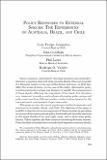Mostrar el registro sencillo del ítem
Policy responses to external shocks: the experiences of Australia, Brazil, and Chile
| dc.contributor.author | Céspedes, Luis Felipe | |
| dc.contributor.author | Goldfajn, Ilan | |
| dc.contributor.author | Lowe, Phil | |
| dc.contributor.author | Valdés, Rodrigo | |
| dc.coverage.spatial | AUSTRALIA | es_ES |
| dc.coverage.spatial | BRASIL | es_ES |
| dc.coverage.spatial | CHILE | es_ES |
| dc.date.accessioned | 2019-11-01T00:03:06Z | |
| dc.date.available | 2019-11-01T00:03:06Z | |
| dc.date.issued | 2006 | |
| dc.identifier.isbn | 956-7421-23-4 | |
| dc.identifier.uri | https://hdl.handle.net/20.500.12580/3709 | |
| dc.description | Open economies, particularly emerging markets and commodityintensive economies, deal with large external shocks. These are typically of a financial nature in the case of the former and real—in that they affect the terms of trade—in the case of the latter. Alternative policy reactions and policy setups may dampen or amplify the consequences of these shocks, affecting the magnitude of the shock. It is therefore very important to analyze and evaluate alternative policy setups and policy reactions from different angles in order to draw lessons for the macroeconomic management of open economies. | |
| dc.format | ||
| dc.format.extent | Sección o Parte de un Documento | |
| dc.format.medium | p. 109-170 | |
| dc.language.iso | eng | |
| dc.publisher | Banco Central de Chile | |
| dc.relation.ispartof | Series on Central Banking, Analysis, and Economic Policies, no. 10 | |
| dc.rights | Attribution-NonCommercial-NoDerivs 3.0 Chile | * |
| dc.rights.uri | http://creativecommons.org/licenses/by-nc-nd/3.0/cl/ | * |
| dc.subject | MACROECONOMÍA | es_ES |
| dc.title | Policy responses to external shocks: the experiences of Australia, Brazil, and Chile | |
| dc.type.doc | Artículo | |
| dc.file.name | BCCh-sbc-v10-p109_170 |


